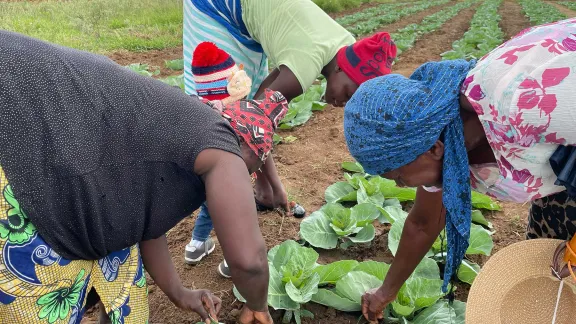Representatives from LWF member churches and country programs around the globe are bringing grassroots experience and expertise to the 68th session of the UN’s Commission on the Status of Women which will be discussing poverty alleviation.

A community garden run by women in Mberengwa, Zimbabwe, where LWF supports skills development and advocacy training as part of its economic justice and women’s empowerment initiative. Photo: LWF/P. Bangoura
On International Women’s Day, LWF says it is “deplorable that the global face of poverty is still predominantly female”
(LWI) - Poverty has a female face. Women and girls around the world are disproportionately affected by poverty which impedes their access to decently paid work, social protection, decision making, and a life with dignity. That is why the Lutheran World Federation (LWF) is present at the United Nations in New York to attend the 68th session of the Commission on the Status of Women (CSW) with its theme of ‘addressing poverty and strengthening institutions and financing with a gender perspective’.
On 8 March, International Women’s Day, a large delegation of women and men representing LWF’s member churches and country programs gathered ahead of the opening of CSW68, where they will be showcasing how they are working to alleviate poverty and tackle these persistent gender inequalities. In a statement, to be presented during the 11 to 22 March session, the LWF says “it is completely deplorable that the global face of poverty is still predominantly female.”
Women of color, the statement notes, face the greatest challenges “due to intersecting sexism and racism.” LWF calls on UN member states “to address inequalities, remove the debt burden and establish a global, fair and legally binding United Nations Tax Convention.” It says the poorest countries spend four times more money on servicing their debts than on providing health care for their citizens. Tax dodging, profiteering and greed take precedence over “people, human rights or the environment.”
We believe that promoting women’s access to quality and decent work is vital for fulfillment of their rights, reducing poverty and attaining broader sustainable development goals.
LWF General Secretary Rev. Dr Anne Burghardt
In a message to CSW participants, LWF General Secretary Rev. Dr Anne Burghardt said girls are increasingly accessing education opportunities, yet “this is not adequately reflected in the makeup of workforces in many industries and within countries as gender-based discrimination and sexism persist.” Burghardt, LWF’s first female leader, noted that women across the globe are paid lower wages than men working in the same jobs and lack access to leadership positions, “a fact that is unduly justified with patriarchal cultural norms and gender roles.”
With the deepening climate crisis, Burghardt continued, women in developing countries are at a higher risk of losing their livelihoods as most rely on agriculture. She urged UN member states to “take concrete steps to accelerate action to end poverty by creating a new global financial and economic architecture that is conducive to the fulfillment of gender equality and that benefits all of humanity – not only a select few.” LWF believes that “promoting women’s access to quality and decent work” not only contributes to the wellbeing of society but is also “vital for the fulfilment of women's rights, reducing poverty and attaining broader sustainable development goals,” she insisted.
The work of the LWF delegation in New York is closely coordinated by the Lutheran Office for World Community (LOWC), which trains participants to engage effectively with their governments before, during and after the CSW sessions. LWF first started sending regular delegations to CSW in the early 1990s to provide a vital faith-based perspective on issues affecting women at the grassroots in countries around the world.
Tax justice, vocational training, economic agency
On the opening day of the 68th session, LWF delegates from Madagascar, Colombia, Zimbabwe, Cambodia and the United States, alongside colleagues from Canadian Lutheran World Relief, will be taking part in an event to showcase innovative programs that are effectively tackling poverty and working with partners on the ground to promote greater gender equality. Investing in the prevention and response to sexual and gender-based violence will also be on the agenda, highlighting ways in which faith-based organizations are working together to end this global scourge.
At another event, entitled ‘Stealing Our Future’, LWF, together with ecumenical partners ACT Alliance, Norwegian Church Aid and the Finnish Evangelical Lutheran Mission (FELM) will be focusing on ways in which international tax evasion unfairly impacts the lives of women and girls. A panel of participants from various geographic regions will suggest pathways to tackle the legal gaps that facilitate this abuse, including the introduction of a legally binding United Nations Tax Convention.
LWF’s work to empower women in the Middle East and North Africa region will be under the spotlight at another event entitled ‘Faith in Action: Pathways to women’s economic agency’. Delegates from Palestine, Jordan, Syria and Iraq will discuss how these vocational training and financial inclusion programs are successfully helping women to escape poverty and overcome the many barriers they face to achieve fulfilling careers and financial goals.


